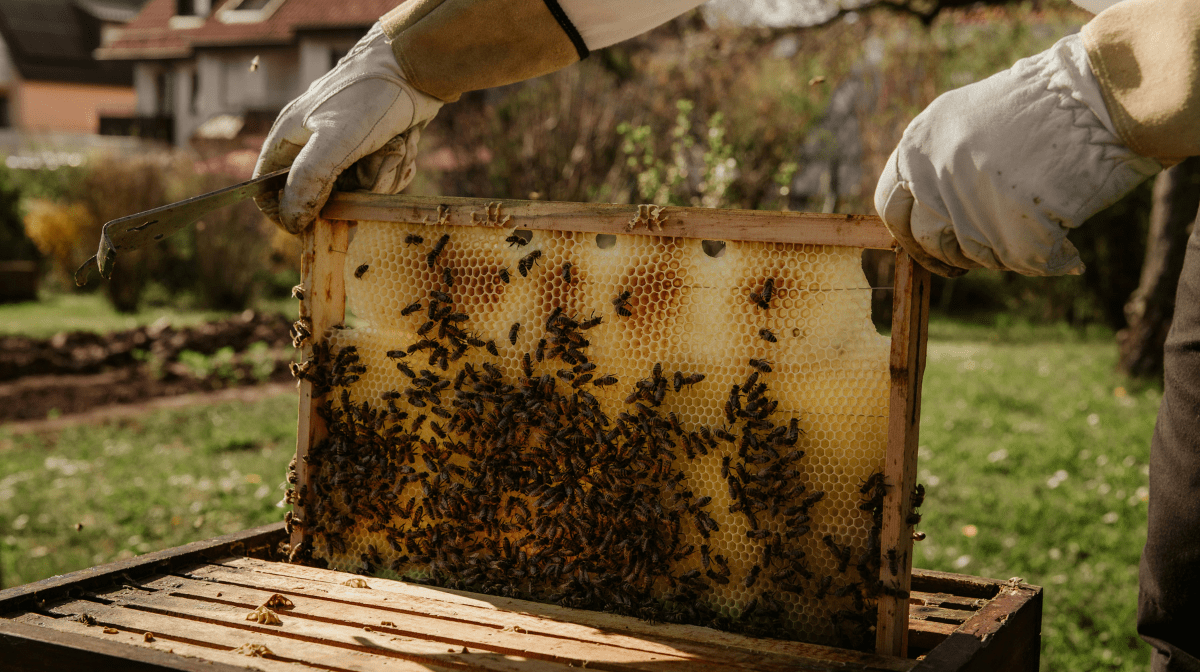Often incorporated into breakfasts for an added burst of sweetness, Manuka honey may provide you with benefits additional to the ones provided by regular honey.
Sometimes referred to as ‘liquid gold,’ this distinct honey variety is a favourite among many health enthusiasts. But what is Manuka honey and why is there such a buzz around it? Carry on reading to uncover everything you need to know about this sweet substance and the many health benefits it could provide you with.
What is Manuka Honey?
Manuka honey is a unique and highly-prized honey variety that originates primarily from the nectar of the Manuka tree, which is native to New Zealand and parts of Australia.
Manuka has a slightly different composition to regular honey, as it contains methylglyoxal (MGO), a naturally-occurring compound that is thought to possess certain antibacterial properties.
The grading of Manuka honey is commonly based on its MGO content, serving as an indicator of potency. The higher the MGO levels, the greater the potency and the greater the honey’s potential benefits. This unique grading system allows you to choose the specific Manuka honey rating tailored to your needs and preferences. Whether that be for everyday use, skincare support or to help fight off a cold.
How is Manuka Honey Made?
Manuka honey is crafted through the collaboration of honeybees, Manuka flowers, and natural enzymatic activity. These unique flowers bloom only once a year for 2-6 weeks.
It all starts when worker bees pollinate the Manuka flowers and store the nectar in their ‘honey pouch’. They then return to the hive and pass the nectar onto the house bees, who add enzymes to it to break it down and convert it into a sugar.
Next, the honey is stored inside the honeycomb and fanned by the bees to help dry and preserve it. The bees then seal the honeycomb cell with a thin layer of beeswax for future food stores. It’s usually at this point when beekeepers ethically harvest the honey.
Benefits of Manuka Honey
You might be wondering what manuka honey is good for. Not only does it stand out for its earthy, caramel taste, but also for its range of purported health benefits: antibacterial and anti-inflammatory properties. It could help with the following:
May Help to Enhance Wound Healing
Some studies have found that Manuka honey may be able to enhance wound healing. This is due to its reported antibacterial and antioxidant properties, which could provide some protection against infection while promoting the healing process.
Could Aid in Relieving Cough Symptoms
If you’ve got a cough, Manuka honey, like regular honey, may help to alleviate it. A study conducted on children who had an acute cough confirmed this. It emphasised that adding honey to your child’s routine when they have cough symptoms may help to provide relief. However, further research on adults is required to find comparable outcomes.
Potential to Support Digestive Health
Manuka honey’s anti-inflammatory effects may alleviate inflammation in the gut, which could help the digestive function, and potentially relieve the symptoms associated with inflammatory conditions, such as irritable bowel syndrome (IBS) or inflammatory bowel disease (IBD). While more research is needed, incorporating Manuka honey into your diet in moderation may naturally support the digestive system.
Might Protect Skin Health
Applying Manuka honey may help support your skin health. This has been shown in studies that highlight integrating Manuka honey into your skincare regimen may provide valuable support in addressing the symptoms of eczema, thanks to its known soothing and hydrating qualities.
Manuka honey can be applied topically to the skin either by direct application or by combining a few drops to your cleanser or used as a scrub when combined with baking soda.
May Promote Oral Health
Incorporating Manuka honey into your oral care routine may assist in promoting gum health and reducing the risk of dental issues, thanks to its potential to inhibit the growth of bacteria associated with plaque.
Could Improve Hayfever Symptoms
Studies have highlighted that honey may be able to alleviate symptoms of allergic rhinitis, typically when your nose gets irritated by allergens, specifically pollen. This may be because of the MGL (methylglyoxal) present in Manuka, which may be able to inhibit a runny nose associated with allergic rhinitis.
How to Use Manuka Honey
Now you know the many benefits of Manuka honey, you may be wondering how to incorporate it into your routine. There are a myriad of ways you can use Manuka honey, including:
- As an extension to your beauty routine by applying it as a face mask; rinsing off after 15-30 minutes.
- Creating a facial cleanser and incorporating as a first step in your skincare regime.
- Applying to minor cuts or wounds before applying dressing to help with recovery.
- Adding it to a hot beverage as a substitute to sugar.
- Drizzled over many of your favourite meals including granola, pancakes, porridge or even over some veg.
- Honey and ginger gummy supplements for on-the-go benefits.
Before consuming, if you’re diabetic you may need to consult your doctor as Manuka, like other varieties of honey, can have a high sugar content that may not be suitable for your health requirements.
Now you know all there is to know about Manuka honey, explore our collection of Egmont Mānuka Honey today to experience the health properties of unique Manuka Honey.

